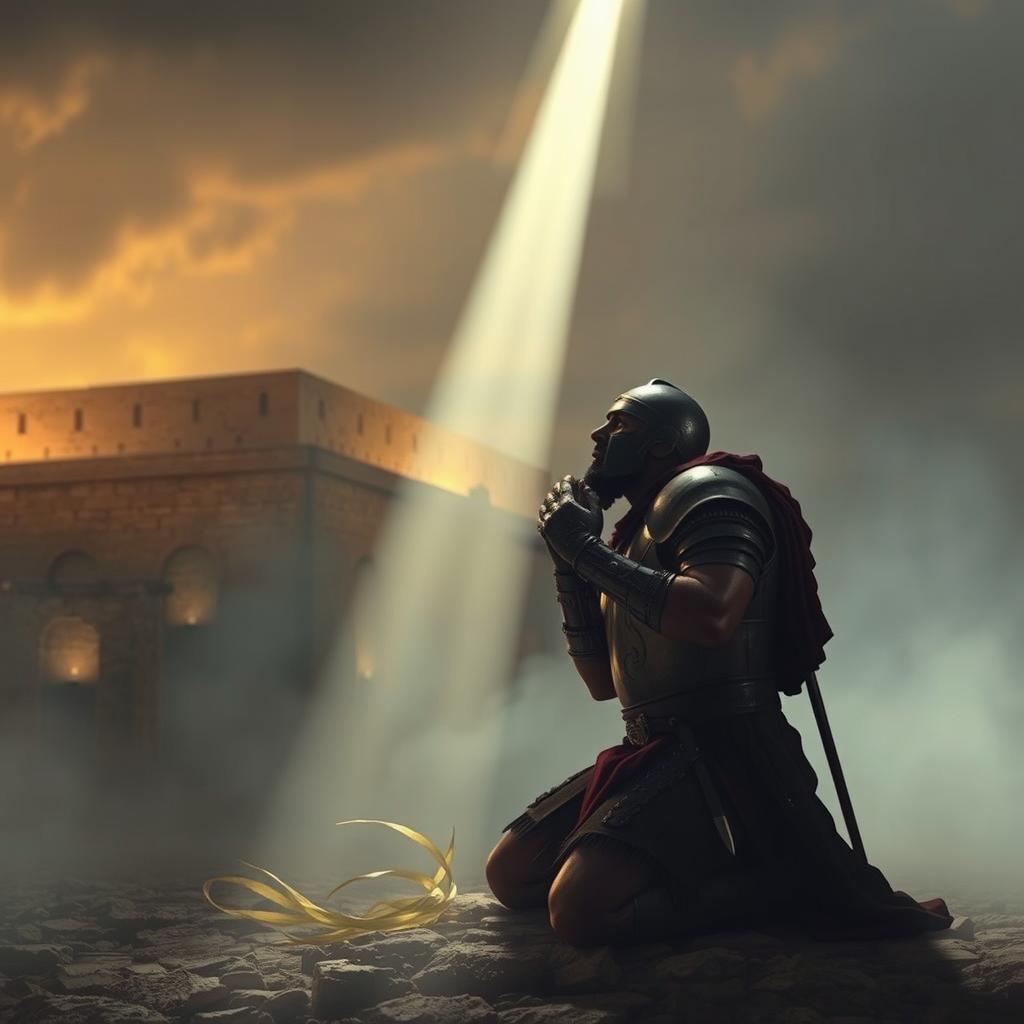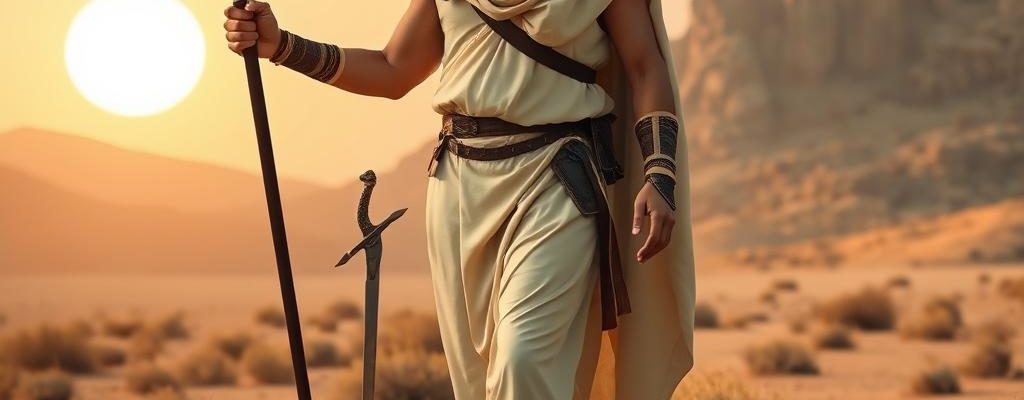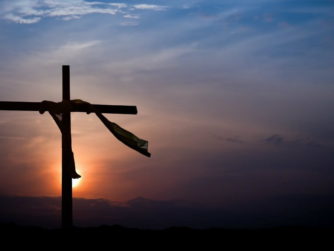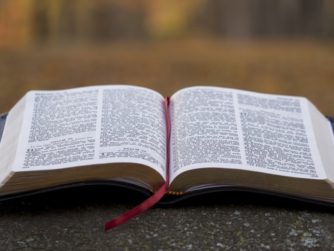An allegory Culled from the Hymn ‘Abide with me’ Author: Henry Francis Lyte (1847)
A Devoted King’s Servant Who Reveres the Presence of God Above the Pleasures of the King and the Palace
First Stanza: The Three Evenings of Darkness
The First Evening: The Snare of Temptation
As the eventide fell upon his home, darkness crept in —not upon him, but upon his household. His wife carelessly bathed in a place of exposure, where wandering eyes could see. That evening, she was taken by the king, and Uriah’s home was trampled on. But Uriah, unaware, remained in the presence of God (the ark of covenant), engaged in the battle of David. In the midst of war, he cried out, seeking divine abiding.
The Second Evening: The Conspiracy of Comfort
Summoned from the battlefield, but carried the spiritual presence of God with him, he was drawn into a snare—not of swords, but of subtle deceit. The king’s table was set before him, yet it was not the bread of righteousness but a feast of distraction. He was urged to take his ease, to find comfort in the embrace of his wife, to abandon the burdens of his brothers in war. Yet, choosing the weight of intercession for his brethren in the battlefield over fleeting pleasure, he lay upon the floor, bearing the burden of God’s presence and his brothers rather than indulging in the king’s feast. How beautiful to have brothers bear each other’s burden in the love of God and unity of the faith, the Christian home and the church will be unconquered in spiritual warfare but will remain overcomers.
The Third Evening: The Dishonor of Drunkenness
Once again, the scheme unfolded. Wine was poured, his honor was defiled, for it is not fitting for a servant of the King of Heaven, a carrier of God’s presence to drink wine so as to remain spiritually alert and aware, avoiding anything that might dull our spiritual senses or hinder our relationship with God, Leviticus 10:9. Do not get drunk with wine, for that is debauchery, but be filled with the Spirit. (Ephesians 5:18, ESV). Yet, though men sought to strip Uriah of dignity, God granted his beloved sleep—not the pleasure of man, but the peace of divine rest. Even as deception surrounded him, he cried out for the abiding presence of God.
Hymn Stanza 1:
Abide with me fast falls the eventide;
The darkness deepens; Lord, with me abide.
When other helpers fail and comforts flee,
Help of the helpless, O abide with me.
Second Stanza: The Journey to Betrayal
As Uriah unknowingly carried his own death sentence to Joab, he nurtured no spirit of suspicion against his brethren—David and Joab. Though his fate was sealed, his spirit perceived that life’s journey was swiftly drawing to a close. He understood that “Swift to its close ebbs out life’s little day,” meaning that mortality is inevitable. His unwavering loyalty was repaid with betrayal, yet in his abandonment, he found solace in the unchanging nature of God. As his strength waned fighting the physical battle with the ammonite and spiritual battle of suspicion and bitterness as his brethren turned away (changed towards him), he placed his trust not in man, but in the One who remains steadfast, lifting his voice to sing:
Hymn Stanza 2
Swift to its close ebbs out life’s little day;
Earth’s joys grow dim, its glories pass away.
Change and decay in all around I see.
O thou who changest not, abide with me.
Third Stanza – The Final Stand: The Cry for God’s Presence
As each hour passed and the enemy’s assault grew fiercer, Uriah cried out for God’s abiding presence. The devil sought to corrupt his heart with bitterness toward the brethren who had forsaken him, but he refused to be ensnared. Instead, he leaned on God’s grace, knowing only divine strength from His presence could foil the tempter’s power. Though abandoned by men, he longed not for their presence, but for the guiding hand of God to uphold him. And so, he lifted his voice in prayer:

Hymn Stanza 3
I need thy presence every passing hour.
What but thy grace can foil the tempter’s power?
Who like thyself my guide and strength can be?
Through cloud and sunshine, O abide with me.
Stanza Four: The Triumph Over Death
Having been assured of God’s presence, Uriah no longer feared the powers of hell, the sting of death, or the schemes of men. His wounds and tears bore no bitterness toward his brethren—only the peace of divine righteousness. The Lord comforted him, revealing that death held no victory over those who belong to Him.
According to Deuteronomy 22:22, both Bathsheba and King David should have been stoned to death for their sin, so that evil would be purged from Israel, yet earthly justice was swayed by power. The flesh—represented by King David’s authority—had overruled righteousness, cheating man and subjecting him to evil. But in Uriah’s silent suffering, God foreshadowed Christ’s sacrifice:
“He made Christ, who knew no sin, to be sin on our behalf, so that in Him we would become the righteousness of God.” (2 Corinthians 5:21)
Though God could have saved Uriah, He allowed him to die—just as Christ was forsaken. Uriah was betrayed and deserted by his brethren, just as Jesus was abandoned by His disciples.
Thus, just as we have life through Christ, our union is with Him, and our newgenealogy—through spiritual rebirth—is traced to Christ. In the genealogy of Christ recorded in Scripture, Uriah is notably mentioned as the husband of Bathsheba, affirming that in him was the legitimate marriage and through his wife Christ shall be born. His name stands as a testament to righteousness, while his sacrifice foreshadows the redemptive work of Christ.
Hymn Stanza 4
I fear no foe with thee at hand to bless,
ills have no weight, and tears no bitterness.
Where is death’s sting? Where, grave, thy victory?
I triumph still, if thou abide with me.
Last Stanza: The Ultimate Sacrifice on the Cross for Redemption and the Eternal Dawn
Just as the flaming sword placed by God at Eden barred fallen man (human nature) from access to the Tree of Life—requiring the death of the old man before new and eternal life could begin—so Uriah bore the penalty that others should have faced. The flaming sword, now represented by the cross, marked divine justice—an irreversible sentence upon fallen humanity. Yet the debt we could not pay, Christ bore upon Himself. He took on the old man, and that sword (the iron cross) fell upon Him through the wooded beams of Calvary, fashioned by the hands of the Romans after being condemned by His own people (the Jews), that the old man might be crucified and the way for new life opened.
In like manner, Uriah met his death by the sword of the children of Ammon—a shadow of the cross —betrayed by his own brethren. His death made way for David and Bathsheba’s redemption, just as Christ’s sacrifice paved the way for the redemption of all mankind. Yet, unlike fallen man, Uriah did not resist; he embraced this cross, willingly taking the place of those who had wronged him, mirroring the Lamb slain from the foundation of the world.
As he walked into death’s valley, he surrendered his fleeting breath in prayer, asking the Lord to let him take up the cup of suffering—the punishment for the sins of David, his wife, and his brethren; to become cursed so that evil/curse will be taken away from the land of Israel. He pleaded, “Hold up the cross before my closing eyes; I will bear the punishment for their sin.” With his last breath, he surrendered his spirit to the eternal light breaking forth.
Hymn Stanza 5
Hold thou thy cross before my closing eyes.
Shine through the gloom and point me to the skies.
Heaven’s morning breaks and earth’s vain shadows flee;
In life, in death, O Lord, abide with me.





